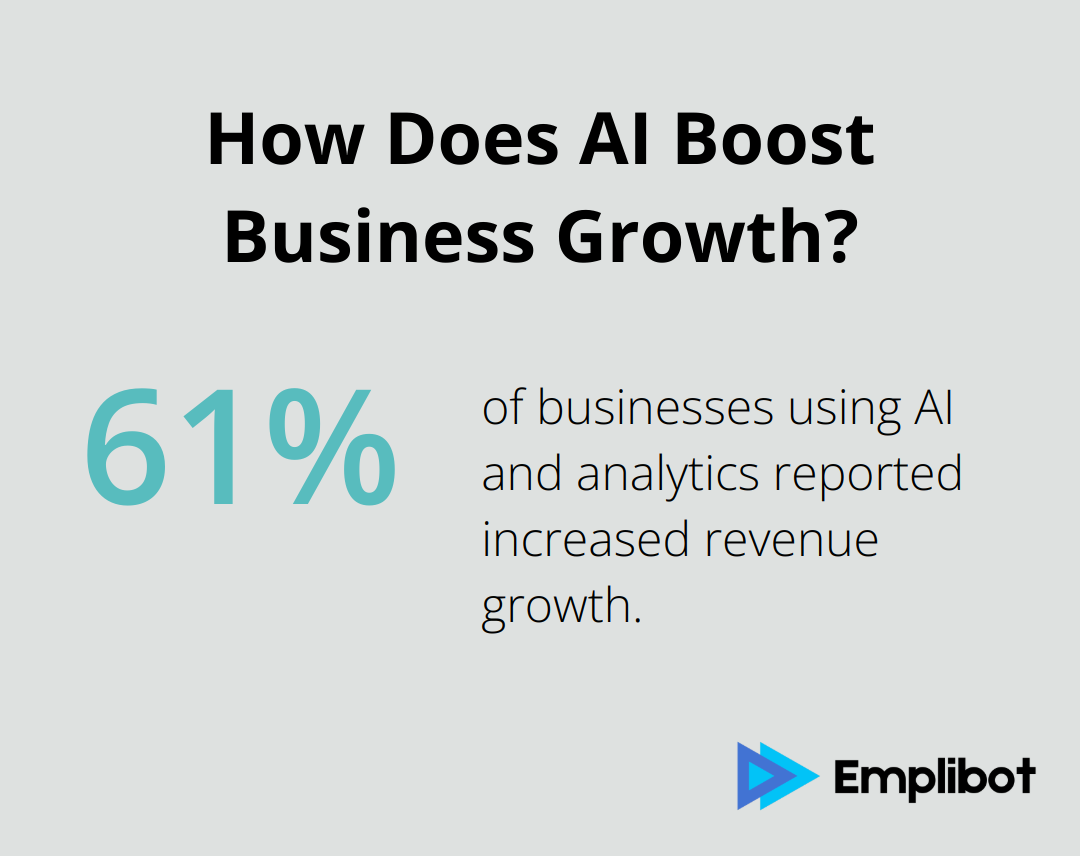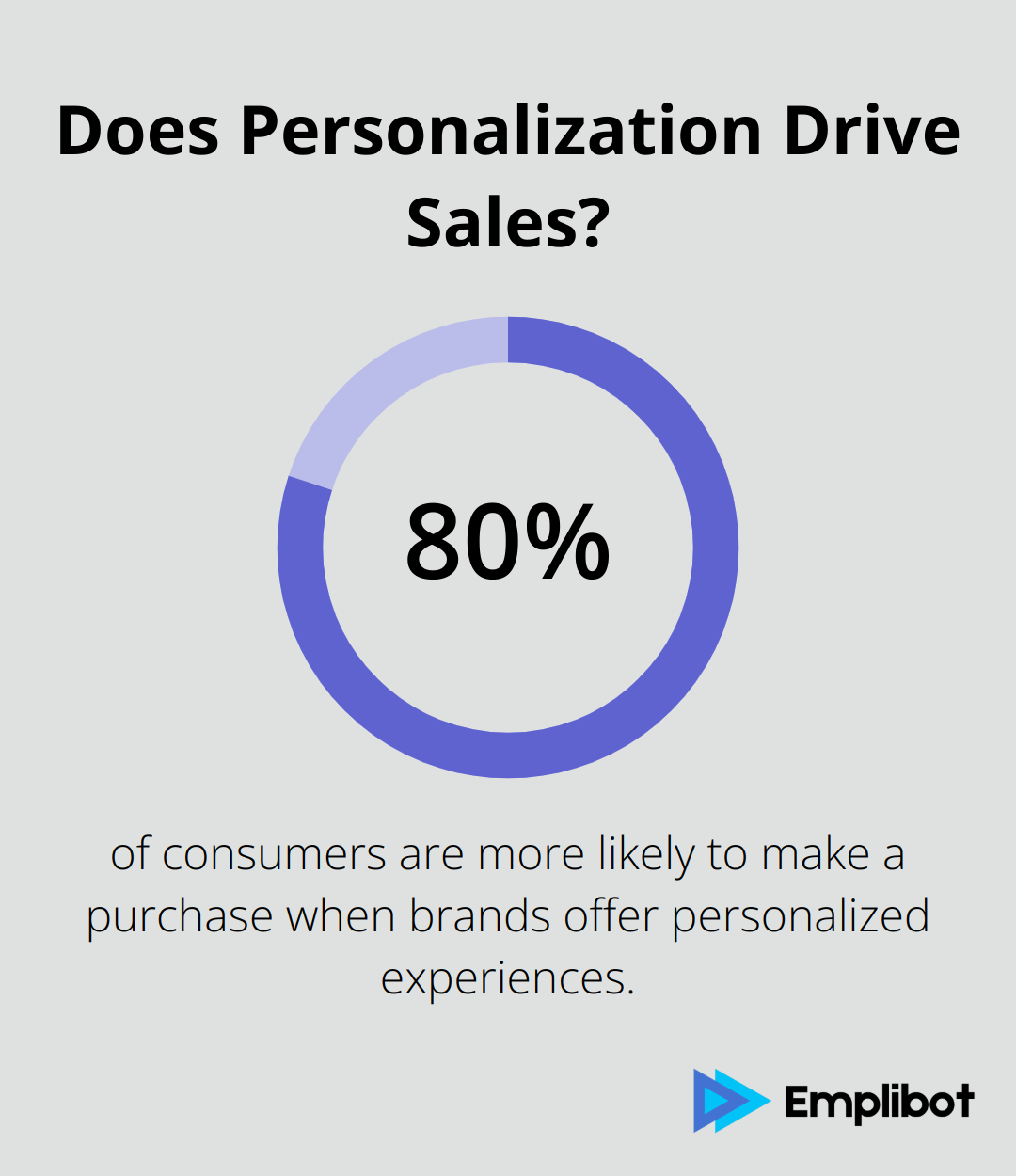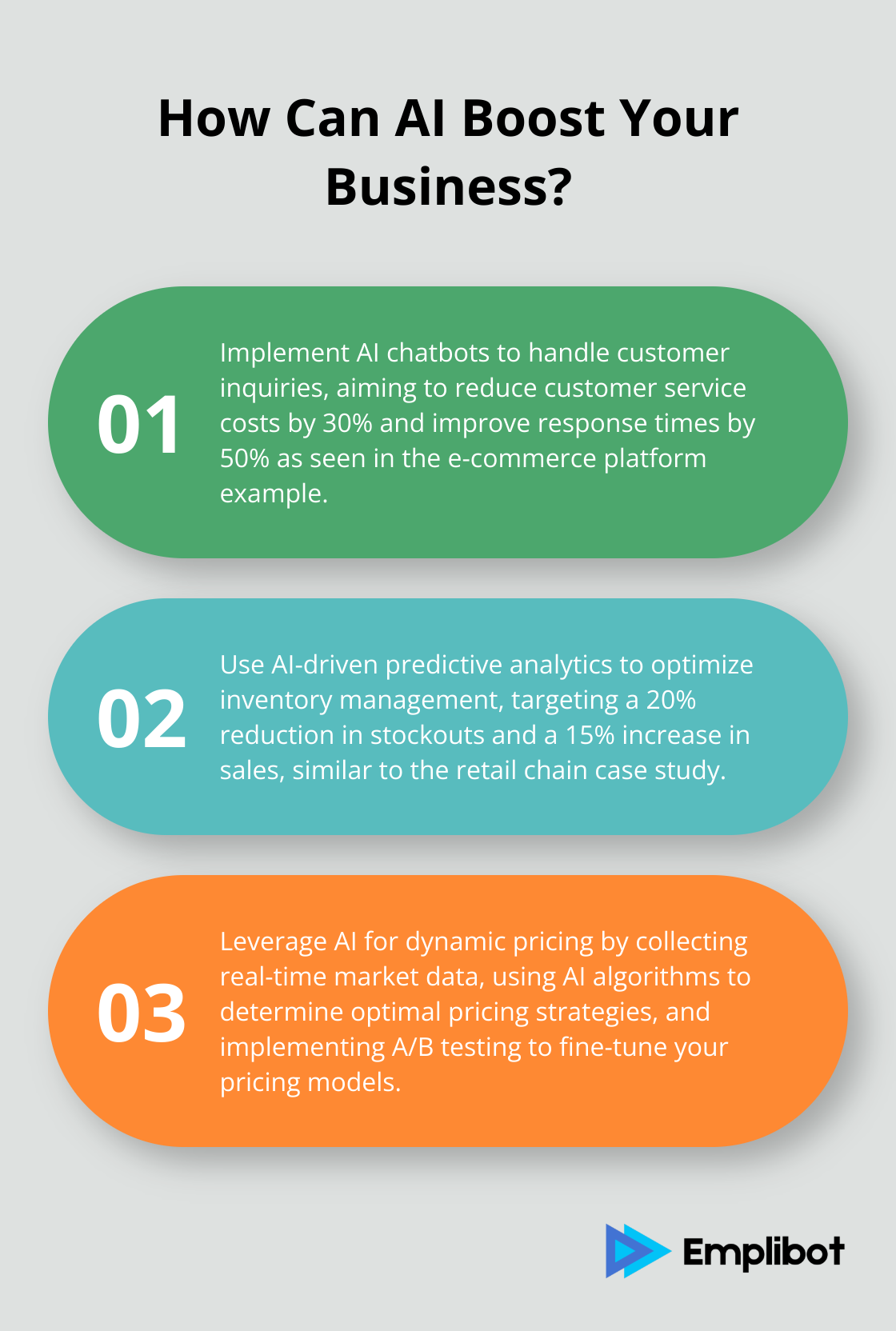AI applications for business are revolutionizing the way companies operate and compete in today’s market. From automating routine tasks to providing deep insights from complex data, AI is transforming every aspect of business operations.
At Emplibot, we’ve seen firsthand how AI can drive efficiency, boost sales, and enhance customer experiences. This blog post will explore key AI applications that can propel your business to success and provide practical tips for implementation.
How AI Boosts Your Business Efficiency
AI applications transform business operations, offering unprecedented opportunities to streamline processes and increase productivity. Let’s explore key ways AI enhances business efficiency.
Supercharge Customer Service with AI
AI-powered chatbots handle a wide range of customer inquiries, from simple FAQs to complex issues. Juniper Research predicts chatbots will be responsible for cost savings of over $8 billion by 2022. These virtual assistants operate 24/7, provide instant responses, and free up human agents for more complex tasks.

A major e-commerce platform implemented AI chatbots and reduced customer service costs by 30% while improving response times by 50%. This not only increased efficiency but also significantly boosted customer satisfaction scores.
Make Smarter Decisions with Predictive Analytics
AI’s ability to process and analyze vast amounts of data revolutionizes decision-making processes across industries. Predictive analytics powered by AI forecast trends, identify potential risks, and uncover hidden opportunities with remarkable accuracy.
Accenture found that 61% of businesses using AI and analytics reported increased revenue growth. A retail chain used AI-driven predictive analytics to optimize its inventory management, resulting in a 20% reduction in stockouts and a 15% increase in sales.
Streamline Workflows with Process Automation
AI makes waves in process automation, helping businesses eliminate repetitive tasks and optimize workflows. From automating data entry to managing complex supply chains, AI frees up valuable human resources for more strategic work.
McKinsey Global Institute estimates that automation could raise productivity growth globally by 0.8 to 1.4 percent annually. Companies reduce processing times for routine tasks by up to 80% through AI-powered automation.
Implement AI Strategically
To maximize the benefits of AI for business efficiency, implement these technologies strategically. Identify areas in your business where AI can have the most significant impact. Align AI initiatives with your specific business goals, whether it’s enhancing customer service, improving decision-making, or streamlining operations.
AI tools like chatbots and predictive analytics platforms are most effective when combined with human expertise. The goal isn’t to replace human workers but to augment their capabilities and free them up for higher-value tasks.
As you explore AI applications for your business, consider partnering with experienced providers (like Emplibot) who can guide you through the implementation process. With the right approach, AI can become a game-changer for your business efficiency and overall success.
Now that we’ve covered how AI boosts business efficiency, let’s explore how AI can revolutionize your marketing and sales efforts, taking your customer engagement and revenue generation to new heights.
How AI Transforms Marketing and Sales
AI reshapes marketing and sales strategies, offering unprecedented opportunities for personalization, lead generation, and revenue optimization. This chapter explores how businesses can leverage AI to create tailored customer experiences, identify high-quality leads, and implement dynamic pricing strategies.
Creating Hyper-Personalized Customer Experiences
AI-driven personalization is reshaping marketing, offering unparalleled insights and engagement opportunities with consumers. Epsilon reports that 80% of consumers are more likely to make a purchase when brands offer personalized experiences.

Netflix uses AI to analyze viewing habits and generate personalized recommendations. This level of personalization keeps customers engaged and coming back for more.
To implement AI-powered personalization:
- Collect and centralize customer data from all touchpoints
- Use AI tools to segment your audience based on behavior, preferences, and demographics
- Create dynamic content that adapts to individual user profiles
- Test and refine your personalization strategies continuously
Supercharging Lead Generation and Scoring
AI revolutionizes lead generation and scoring by identifying high-potential prospects with greater accuracy. A Harvard Business Review study found that with generative AI, reporting systems can become even more powerful and forward-looking. Managers can pose questions to get insights for helping their teams improve performance.
Harley-Davidson implemented an AI-powered marketing platform that increased leads by 2,930% in New York City alone. The system identified high-intent customers and engaged them with personalized content, dramatically improving conversion rates.
To leverage AI for lead generation:
- Implement AI-powered chatbots on your website to engage visitors and qualify leads
- Use predictive analytics to identify patterns in your successful conversions
- Automate lead scoring based on multiple data points (including online behavior and engagement)
- Integrate AI tools with your CRM to provide sales teams with actionable insights
Optimizing Revenue with Dynamic Pricing
AI-driven dynamic pricing adjusts prices in real-time based on market demand, competitor pricing, and other factors. McKinsey reports that companies using AI for dynamic pricing see profit margins increase by 5-10%.
Airlines have long used dynamic pricing, but now retailers are catching up. Amazon changes prices on its products every 10 minutes on average, using AI to optimize for maximum revenue.
To implement dynamic pricing:
- Collect and analyze real-time market data, including competitor prices and demand fluctuations
- Use AI algorithms to determine optimal pricing strategies
- Implement A/B testing to fine-tune your pricing models
- Monitor and adjust your strategies based on performance metrics
AI in marketing and sales creates more engaging customer experiences, identifies and nurtures high-quality leads, and optimizes pricing strategies for maximum revenue. As these technologies continue to evolve, businesses that embrace AI tools will gain a significant competitive advantage. However, implementing AI solutions can present challenges. The next chapter will address common obstacles in AI adoption and provide strategies to overcome them.
Navigating AI Adoption Hurdles
Data Quality: The Foundation of AI Success
AI applications rely on high-quality data. Poor data quality costs organizations at least $12.9 million a year on average, according to Gartner research from 2020. To address this issue:
- Audit your data sources regularly to identify inconsistencies and gaps.
- Implement data governance policies to maintain data integrity.
- Use data cleansing tools to standardize and normalize your data.
- Invest in data enrichment services to supplement your existing datasets.

A retail company improved their AI model accuracy by 35% after implementing a comprehensive data quality program.
Integrating AI with Existing Systems
Many businesses face challenges when integrating AI solutions with their current infrastructure. A Deloitte survey found that 47% of organizations struggle to integrate AI technologies with their existing processes.
To ensure smooth integration:
- Conduct a thorough assessment of your current IT landscape.
- Choose AI solutions with robust API capabilities for easier integration.
- Start with less critical systems and expand gradually.
- Partner with AI providers experienced in working with legacy systems.
A manufacturing firm successfully integrated AI-powered predictive analytics with their 20-year-old ERP system, reducing downtime by 23%.
Empowering Your Team for AI Adoption
Employee resistance and lack of skills can hinder AI adoption. MIT Sloan Management Review revealed that 40% of companies struggle with AI due to a lack of skills among their workforce.
To address this challenge:
- Develop a comprehensive AI training program for employees at all levels.
- Create cross-functional teams to foster collaboration and knowledge sharing.
- Implement a change management strategy to address concerns and build enthusiasm.
- Consider hiring AI specialists or partnering with external experts to fill skill gaps.
A financial services company saw a 60% increase in AI project success rates after implementing a company-wide AI literacy program.
Overcoming Ethical and Regulatory Challenges
AI adoption raises ethical concerns and regulatory compliance issues. Companies must address these challenges to ensure responsible AI use.
Key steps include:
- Establish an AI ethics committee to oversee AI initiatives.
- Develop clear guidelines for AI use within your organization.
- Stay informed about AI-related regulations in your industry.
- Implement transparency measures in AI decision-making processes.
Measuring ROI and Demonstrating Value
Demonstrating the return on investment (ROI) of AI initiatives can prove challenging. To effectively measure and communicate AI’s value:
- Define clear, measurable objectives for each AI project.
- Establish baseline metrics before implementing AI solutions.
- Use A/B testing to compare AI-driven processes with traditional methods.
- Regularly report on AI project outcomes to stakeholders.
Accenture research found that three-in-four (74%) organizations have seen investments in generative AI and automation meet or exceed expectations. This statistic underscores the potential value of overcoming AI adoption hurdles.
Final Thoughts
AI applications for business transform company operations, marketing, and growth strategies. These technologies revolutionize efficiency through intelligent chatbots, predictive analytics, and data-driven decision-making. In marketing and sales, AI enables personalized customer experiences, enhances lead generation, and optimizes pricing for maximum revenue.

Strategic AI implementation aligns initiatives with business goals and integrates them into existing processes. Companies that take this approach will see substantial benefits in efficiency, productivity, and revenue growth. As AI technologies evolve, we expect more innovative applications across industries, pushing the boundaries of business operations and strategy.
Emplibot offers a comprehensive solution for content marketing automation, handling everything from keyword research to content creation and distribution. This enables businesses to increase their online presence and drive growth effortlessly. Companies that embrace AI technologies and adapt to the AI-driven landscape will thrive in the increasingly competitive global market.

